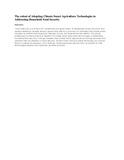Please use this identifier to cite or link to this item:
http://ir-library.mmust.ac.ke:8080/xmlui/handle/123456789/1807Full metadata record
| DC Field | Value | Language |
|---|---|---|
| dc.contributor.author | Nyale, E. H. | - |
| dc.contributor.author | China, S. S | - |
| dc.contributor.author | Nabiswa, F. | - |
| dc.date.accessioned | 2021-12-14T11:51:49Z | - |
| dc.date.available | 2021-12-14T11:51:49Z | - |
| dc.date.issued | 2019-11-11 | - |
| dc.identifier.uri | https://doi.org/10.29322/IJSRP.9.11.2019.p9579 | - |
| dc.identifier.uri | http://www.ijsrp.org/research-paper-1119.php?rp=P959360 | - |
| dc.identifier.uri | http://ir-library.mmust.ac.ke:8080/xmlui/handle/123456789/1807 | - |
| dc.description.abstract | Food insecurity is a concern for households and government. It destabilizes social, economic and political wellbeing. Despite Kenya’s government efforts in provision of incentives like climate smart subsidies to address food insecurity, Makueni County still experiences food deficit. This article endeavored to assess extent of adoption of climate smart agriculture technologies in addressing household food security. Findings revealed that climate smart agriculture technology accessed and practiced had low adoption on food security. Farmers were willing to adopt technology but cultural factors hindered its adoption. From findings, limited resources was the main constraints to CSA technologies adoption and extension services provision. | en_US |
| dc.language.iso | en | en_US |
| dc.publisher | International Journal of Scientific and Research Publications | en_US |
| dc.subject | extent , Adopting, Climate, Smart, Agriculture, Technologies , Addressing,Household, Food,Security | en_US |
| dc.title | The extent of Adopting Climate Smart Agriculture Technologies in Addressing Household Food Security | en_US |
| dc.type | Article | en_US |
| Appears in Collections: | Gold Collection | |
Files in This Item:
| File | Description | Size | Format | |
|---|---|---|---|---|
| The extent of Adopting Climate Smart Agriculture Technologies in Addressing Household Food Security.pdf | 244.37 kB | Adobe PDF |  View/Open |
Items in DSpace are protected by copyright, with all rights reserved, unless otherwise indicated.
